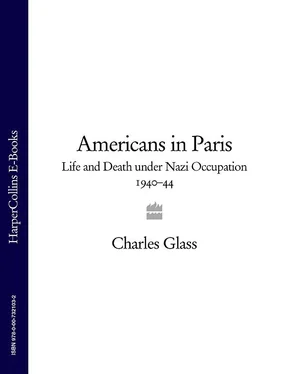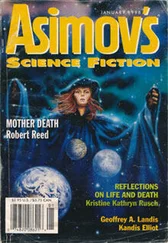The civil war in Spain brought American writers back to Paris, where they took leave from the battlefront. Ernest Hemingway, John Dos Passos and the English poets W. H. Auden and Stephen Spender became Sylvia’s loyal customers. Sylvia persuaded Hemingway to do a reading to raise funds. He agreed on condition that Spender join him on the platform. This was less generosity than stage-fright. He was so nervous that he drank copiously before and during his reading of the short story ‘Fathers and Sons’. Faltering at first, he was declaiming like a Shakespearean dramatist by the end. The Paris Herald Tribune wrote, ‘He was beginning to show grace under pressure.’ Hemingway left Europe again when the Republicans lost the war in Spain and the half million Spanish refugees who escaped to France were be interned in camps.
In 1936, with the shop on a more secure footing, Sylvia made her first visit to the United States since coming to Paris in 1917. Her older sister, Holly, followed by younger sister Cyprian and their father, had moved to Altadena, California, where Sylvia saw them for a few weeks. By the time she stopped in Princeton to see childhood friends, severe menstrual bleeding took her to a Connecticut hospital for diagnosis and a hysterectomy. While Sylvia was away from Paris, a young German-Jewish photographer, Gisèle Freund, whom she and Adrienne had encountered two years earlier, supplanted her in Adrienne’s affections and apartment. Returning to convalesce in Paris, Sylvia, without demur, moved into the mezzanine rooms above Shakespeare and Company. The three women remained close, usually having lunch together in Adrienne’s kitchen.
A year later, after receiving nominations from parliamentarian Edouard Herriot and Henri Hoppenot, a poet in the French diplomatic corps, the French government made Sylvia a Knight of the Legion of Honour. It was the first official recognition she had received of her contribution to Franco-American letters. While she made light of her ‘little ribbon gibbon given me by the French’, she wore it proudly when occasion demanded.
At the outbreak of war in September 1939, Sylvia’s family urged her to return home. But her home was Paris. Friends, though, were leaving. The few American writers there in 1940, like Henry Miller and Robert McAlmon, as well as the photographer Man Ray, were fleeing to the south, where most went on to safer countries. Gisèle Freund waited until the Germans were bombing the industrial suburbs of Paris before she too escaped, first to the south, finally to Argentina. As a German-Jewish refugee, she would have been arrested immediately. By June 1940, Joyce was on his way to Switzerland. Sylvia Beach, Adrienne Monnier and their contracting circle of brave friends awaited the humiliation of their city.
On Monday, 3 June, Adrienne wrote, ‘Loud noise of planes roaring over our heads. Raid: 200 planes, numerous victims.’ Six days later, she and Sylvia heard German artillery pounding Paris’s outskirts. Adrienne’s diary entry for the day said, ‘We think seriously of putting mattresses in the cellar to sleep on.’ Only the day before, a friend warned them that ‘Paris will be involved in the battle.’ Two days later, the same friend’s husband ‘let me understand that Paris will not be involved in the battle’. Rumours, compounded by government radio bulletins that lied about the war, were confusing rather than reassuring. Someone warned Adrienne that, if she stayed in Paris, people would assume she welcomed German occupation. By the morning of 12 June, Adrienne was ready to quit: ‘Personal longing to leave and go to Rocfoin’, the village southwest of Paris where her mother and father had a smallholding. After asking Sylvia to bicycle to Montparnasse station to see whether there were any trains, Adrienne had lunch in her kitchen with her sister, Marie. Marie, whose pet name was Rinette from Marinette, persuaded her to stay, saying that ‘we should live such moments here’. Sylvia, meanwhile, urged Ruth Camp, a young Canadian student who worked for her, to escape. Canada, unlike the United States, was at war with Germany, making Ruth subject to detention as an enemy alien. Sylvia despaired that ‘she could not be persuaded to leave in spite of my efforts to push her homeward, [and] was still helping me when the Germans swarmed into France’. As the Germans neared Paris, Ruth, in Sylvia’s words, ‘did try to get away. She was machine-gunned in the ditches, and was later interned in spite of her efforts.’ On the 13th, Sylvia had an urge to flee. She went to the American Embassy, where she discovered it was too late.
The anti-Nazi, anti-Soviet, Hungarian-Jewish writer Arthur Koestler had been hiding in Adrienne’s apartment. The French authorities had already interned him with other foreigners, many of whom were also anti-Nazis and Jews. The Nazis would take charge of those still stuck in the camps when the occupation began. After Koestler’s temporary release, Adrienne took him in. He was reading Stendhal’s Le Rouge et le noir on her sofa, when a four leaf clover in the book ‘fell right between his eyes!’ Adrienne kissed the spot and assured him it was an omen that he would be safe. A year later, Koestler wrote discreetly in London, ‘I still had some friends. Who these friends were, how they passed me on in turn, hiding me for one night each, and how they succeeded in obtaining for me a travelling permit to Limoges, where a fortnight later I ceased legally to exist, will be an amusing and moving story to tell at a time when the night has gone from Europe and acts of kindness and solidarity no longer count as crimes.’ When the Nazi night had passed, he was free to give Adrienne credit without putting her in jeopardy: ‘For a few days I remained in hiding, first at the flat of Adrienne Monnier, then at the P.E.N. Club.’ The president of International PEN was Sylvia and Adrienne’s old friend Jules Romains. The French novelist’s anti-Nazi views were known, and he fled Paris for the south in hope of reaching New York with his wife, Lise, the French-American novelist Julien Green and American surgeon Dr Alexander Bruno. Romains said, more in hope than truth, ‘It is impossible that France should go fascist.’
On 14 June, Sylvia’s and Adrienne’s bookshops, like all other businesses in Paris, were closed. Sylvia’s premises enjoyed some protection. Two American diplomats, Third Secretary Tyler Thompson and her friend Keeler Faus, had personally affixed red American seals to her apartment and shop to tell the Germans they belonged to a US citizen. But Sylvia and Adrienne’s anti-Nazi past made them vulnerable to the occupier. Adrienne, as well as hiding Arthur Koestler, had assisted the brilliant German-Jewish writer Walter Benjamin’s escape from Paris to the south of France. (Benjamin was hoping to obtain an American visa from the consulate in Marseilles and travel to the United States via Spain and Portugal. He made an exhausting trek over the Pyrenees, but Spanish police forced him back to Nazi-occupied France. Rather than be sent to a concentration camp, he committed suicide.) Adrienne had also written a long condemnation of Nazi anti-Semitism in her Gazette des Amis des Livres in 1938: ‘From the day the Jews were emancipated (as you know, it is one of the glories of the French Revolution that they were), they have proved that they could be national elements of the first order.’ Sylvia had sold artists’ prints in her shop to raise money for Spain’s legitimate republican government to fight the Nazi-supported Francisco Franco. She also had many Jewish friends, including an unpaid voluntary assistant at Shakespeare and Company, Françoise Bernheim.
As the Germans occupied each arrondissement in Paris, someone told Adrienne that they were ordering everyone to remain indoors for forty-eight hours. Wehrmacht loudspeaker vans repeated this message, until it became known the curfew had been amended to begin at 9 p.m. Adrienne waited with Sylvia all morning in her apartment. At noon, they noticed civilians on the streets. In some places, Parisians were accepting gifts of food from German army trucks sent to feed the populace. In others, women flirted with soldiers. One of the better bordellos posted a notice: ‘Business as usual from 3 p.m.’ A few cafés opened to serve their first uniformed German customers, who were polite and paid for all they ate and drank. Adrienne was disgusted by a common sentiment she overheard: ‘What if the Germans are here? At least there will be order.’ She prepared lunch for Sylvia in the kitchen where for twenty years the earthy and maternal bookseller had cooked oily peasant dinners for the luminaries of French and American literature. It would be her last lunch before the Germans began requisitioning most of France’s food.
Читать дальше












